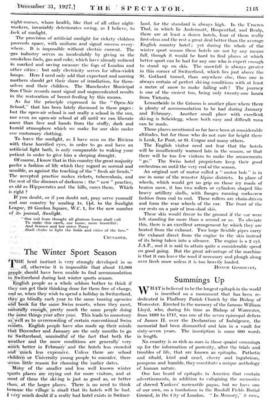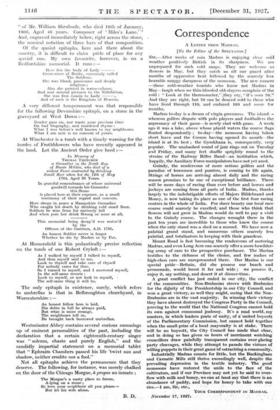Summings Up W HAT-is believed to be the lon g est epitaph in
the world is inscribed on a monument that has been re- dedicated in Fladbury Parish Church by the Bishop of Worcester. Erected to the memory of the famous William Lloyd, who, during his time as Bishop of Worcester, from 1699 to 1717, was one of the seven episcopal defiers of James II. over the Declaration of -Indulgence, the memorial had been dismantled and lain in a vault for sixty-seven years. The inscription is some 600 words in length; No country is so rich as ours in those quaint sun-linings up for the information of posterity, after the trials and troubles of life, that are known as epitaphs. Pathetic and ribald, kind and cruel, cheery and lugubrious, pompous and humble, they constitute a unique anthology of human nature. One has heard of epitaphs in America that contain advertisements, in addition to eulogizing the memories of shrewd Yankees' mercantile papas, but we have one of our own, on a tombstone in the Bunhill Fields Burial Ground, 'in the City of London. "In Memory," it runs, "of Mr. William Shrubsole, who died 18th of January, 1806, Aged 46 years. Composer of Miles's Lane.'" And, engraved immediately below, right across the stone, the musical notation of three bars of that composition.
Of the quaint epitaphs, here and there about the country, it is difficult to claim pride of place for any special one. My own favourite, however, is on a Bedfordshire memorial. It runs :— Here lies the body of Lady
Great-niece of Burke, commonly called The Sublime. She was bland, passionate and deeply religious ; Also she painted in water-colours, And sent several pictures to the Exhibition; She was first cousin to Lady And of such is the Kingdom of Heaven.
A very different temperament was that responsible - for the following Devonshire epitaph, on a stone in the graveyard at West Down :-
Reader pass on, nor waste your precious time On bad biography, and murdered rhyme : What I was before's well known to my neighbours. What 1 am now is no concern of yours.
At Winchester is a tomb with a timely warning for the hordes of Frothblowers who have recently appeared in the land. Let the Ancient Order give heed :- In Memory of THOMAS THETCHER a Grenadier in the North Reg. of Hants Militia, who died of a violent Fever contracted by drinking Small Beer when hot the 12th of May 1764, Aged 26 Years.
In grateful remembrance of whose universal goodwill towards his Comrades this Stone is placed here at their expence, as a small testimony of their regard and concern.
Here sleeps in peace a Hampshire Grenadier Who caughp his death by drinking cold small Beer. Soldiers be wise from his untimely Jail And when yere hot drink Strong or none at all.
This memorial being decay'd was restor'd by the Officers of the Garrison, A.D. 1761: An honest Soldier never is forgot Whether he die by Musket or by Pot.
At Homersfield is this pedantically precise reflection on the tomb of one Robert Cryloft :— As I walked by myself I talked to myself,
And thus myself said to me, Look to thyself and take care of thyself For nobody cares for thee.
So I turned to myself, and I answered myself, In the self-same reverie : Look to myself, or not look to myself, The self-same thing it will be.
The only epitaph in existence, surely, which refers to umbrellas is that in Belbroughton churchyard, in Worcestershire :- An honest fellow here is laid,
His debts in full he always paid, But what is more strange, The neighbours tell us, He brought back borrowed umbrellas;
Westminster Abbey contains several curious summings up of eminent personalities of the past, including the declaration that a certain eighteenth-century singer was "solemn, chaste and purely English," and the candidly impartial statement on a memorial tablet that "Ephraim Chambers passed his life 'twixt sun and shadow, neither erudite nor a fool."
Not all epitaphs achieve the permanence that they deserve. The following, for instance, was merely chalked on the door of the Chicago Morgue, is propos an inmate :
The Morgue's a nasty place to freeze, A-lying on a stone ; So love your neighbour all you please— But let his wife alone.
B. D.



























 Previous page
Previous page